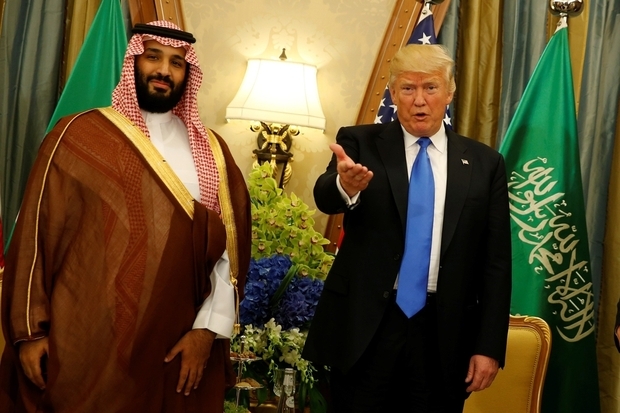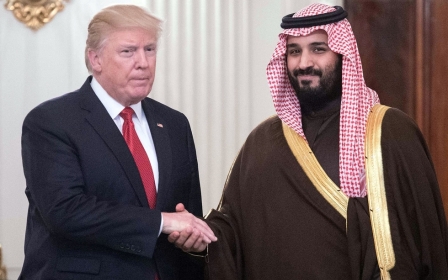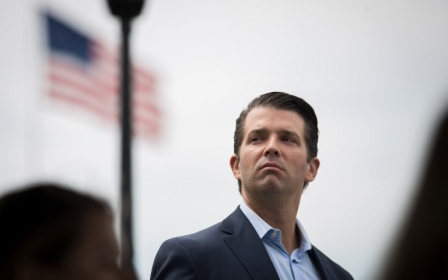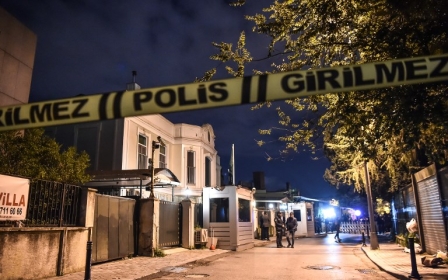The role that Donald Trump has played in emboldening Saudi Arabia's policies

As Saudi Arabia stands accused of killing Washington Post journalist Jamal Khashoggi, calls are getting louder in the United States for Donald Trump to demand real accountability from Riyadh.
Yet while successive US administrations - both Democratic and Republican - have overlooked human rights abuses by Washington's longstanding ally in the Middle East, analysts say Trump’s vocal support for the current Saudi leadership may have enabled an intensifying crackdown on dissent.
The US president keeps reiterating Saudi denials, raising questions on whether the administration will do anything to punish Riyadh if definitive proof emerges that it was involved in the journalist's disappearance.
Aaron David Miller, Middle East program director at the Wilson Center, a Washington-based think tank, noted that the US turning a blind eye to Saudi human rights violations at home is not a Trump phenomenon, but a norm followed by most of the president's predecessors.
"We have rarely, if ever, criticised Saudi policies when it came to domestic affairs," he told MEE in a phone interview last week, when fewer details had been reported about Khashoggi's disappearance.
However, Miller acknowledged that the Trump administration has been "far too accepting and permissive" when it comes to Saudi policies.
"If it's proven that the Saudis are responsible [for Khashoggi's disappearance], it's basically on the Saudis. There's no way to blame Trump for that," Miller said.
Trump's uncritical position
Khashoggi, who was last seen entering the Saudi consulate in Istanbul on 2 October to retrieve paperwork, had been living in self-imposed exile in the US at the time of his disappearance. A prominent journalist and columnist for The Washington Post, he left Saudi Arabia amid fears he would be arrested for his criticism of the Saudi leadership - and how close it was getting to the Trump administration.
Breaking with tradition that saw US presidents visit neighbouring Canada or Mexico first after taking office, Trump made his first foreign trip to Saudi Arabia last year, announcing a multi-billion dollar deal to sell weapons to its government.
Despite growing calls by humanitarian organisations and some US lawmakers against the Saudi-led war in Yemen, the White House has failed to lead efforts to end the conflict.
When Saudi Arabia, along with the UAE, Bahrain and Egypt, imposed a blockade on Qatar last year, Trump initially took the side of Riyadh, even as his own secretary of state and Pentagon chief called for an end to the crisis. He later changed his stance toward the diplomatic impasse, praising Doha's "counter-terrorism" efforts.
Do I believe MBS believes that he has a greater range of action because of his relationship with Donald Trump? Absolutely. There's no question about it. What you cannot prove, and what I don't know, is whether or not there is direct causality
-Aaron David Miller, Middle East program director at the Wilson Center
The Trump administration has also been silent on the feud between Canada and Saudi Arabia. Riyadh threw a tantrum, in the words of some analysts, when Ottawa called for the release of detained Saudi human rights campaigners earlier this year.
And after bin Salman, also known as MBS, locked up dozens of royal family members, businessmen, journalists and Islamic scholars over alleged corruption charges in November 2017, Trump was not merely indifferent; he appeared to endorse the purge.
"I have great confidence in King Salman and the Crown Prince of Saudi Arabia, they know exactly what they are doing..." he wrote on Twitter at the time. "Some of those they are harshly treating have been 'milking' their country for years!"
Miller said any possible responsibility Trump holds over Khashoggi's disappearance and purported murder hangs on one question that is impossible to answer: Has Washington's uncritical approach to Saudi Arabia's behaviour in Yemen, Qatar and even Canada had a "direct causal effect on how Saudis are pursuing dissidents"?
"Do I believe MBS believes that he has a greater range of action because of his relationship with Donald Trump? Absolutely. There's no question about it. What you cannot prove, and what I don't know, is whether or not there is direct causality," he said.
'Shocking' reaction to Khashoggi disappearance
Saudi officials have strongly denied any involvement in Khashoggi's disappearance and say that he left the consulate soon after arriving. However, they have not presented any evidence to corroborate their claim and say that video cameras at the consulate were not recording at the time.
On Tuesday afternoon, Donald Trump tweeted that he spoke to bin Salman, who "totally denied any knowledge of what took place" in Istanbul. Trump said MBS told him "that he has already started, and will rapidly expand, a full and complete investigation into this matter".
Saeed Khan, a senior lecturer in Near East studies at Wayne State University in Detroit, said the administration's reaction to Khashoggi's disappearance has been "shocking".
"A so-called American ally is able to operate with impunity, allegedly killing and dismembering a lawful permanent resident, a 'green card' holder, in a NATO-allied country, Turkey," Khan said. "It is very convoluted. I think it affirms a very disturbing trend and deference that the Trump administration has [shown] to such egregious behaviour by many people that this administration calls some of its staunchest allies and friends."
He cited Trump's warm personal relationship with Russia's Vladimir Putin and North Korea's Kim Jong-Un, who are both accused of major human rights violations.
Echoing Miller's comments, Khan said it is important to take into consideration the broader historical context for close US-Saudi relations: Washington treats Riyadh - at least in public - with "kid gloves" for its own, geostrategic reasons, namely oil, he said.
Nader Hashemi, director of the Center for Middle East Studies at the University of Denver's Josef Korbel School of International Studies, said Trump made Saudi Arabia the "anchor" of his Middle East policy.
Hashemi pointed to Trump's son-in-law and senior adviser Jared Kushner's close relationship with bin Salman as especially important to the Khashoggi case.
"I would argue that it was exactly and precisely because MBS thought he had Trump in his back pocket that he felt he could assassinate Khashoggi and get away with it," Hashemi told MEE via email. "In other words, the Trump/Kushner embrace of MBS encouraged his worst instincts and contributed [to] the murder and [to] the subsequent global crisis."
'Enemies of the people'
US analysts have been cautioning against Trump's cozy relationship with the Saudi royals for a long time.
Late last year, Khashoggi's Washington Post editor, Karen Attiah, who has been outspoken about his disappearance, warned against bin Salman's erratic policies, including the reported detention of Lebanese Prime Minister Saad Hariri and the "arrests of scores of elites, clerics, social media stars [and] princes".
"Saudi Arabia is leaning heavily on the Trump card — relying on Trump’s full-throated endorsement of MBS’s actions," Attiah wrote at the time. "But Trump could be making a huge mistake by putting all of America’s eggs in the reckless MBS’s basket."
The administration's detractors have also highlighted Trump's own rhetoric against US-based critics and journalists, whom he has dubbed "enemies of the people".
"Such tactics help to further normalise a culture in which dissent is marginalised, criminalised or altogether erased," academic and civil rights activist Marc Lamont Hill wrote in a Huffington Post column last week.
- Jillian Kestler-D'Amours contributed to the reporting.
Middle East Eye propose une couverture et une analyse indépendantes et incomparables du Moyen-Orient, de l’Afrique du Nord et d’autres régions du monde. Pour en savoir plus sur la reprise de ce contenu et les frais qui s’appliquent, veuillez remplir ce formulaire [en anglais]. Pour en savoir plus sur MEE, cliquez ici [en anglais].




